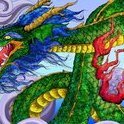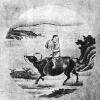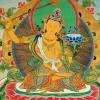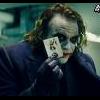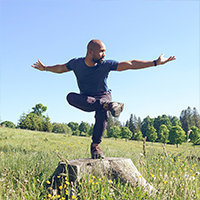Search the Community
Showing results for 'Dream'.
Found 7,591 results
-
Ha! Youy call that bad ? Our family used to dream of having fingers . And we never had any spelling either - not even poor spelling .
-
My bike is in the garage. My drum set is in the back bedroom. I dream of owning a moon, but it wouldnt fit in the garage and the Sun would eat my sticks and make the throne particularly sweaty.
-
Back to the question of humans being animals. Well, part of us is. My view of this is based on the "doctrine of signatures", and on an essentially neo-Platonic/Hermetic model of the Cosmos. According to this view, existence evolves through a number of levels. "Below" the human being (and there is no evaluation connected to this), there is inorganic matter, plant life, and animal life. Those forms if existence are more closely connected to the Earth. "Above" the human being, there are levels of non-material existence. In the Abrahamic traditions, these belong to angels, archangels etc, all the way up to the nous. Other traditions speak of various Deities, Bodhisattvas etc. It really makes no difference. Those are the levels that we associate with the the heavens, or various spiritual realms. Human beings are right in the middle zone between the realms "below" and "above." It's as though angelic beings have taken hold of animal bodies, (quite literally) uplifting them, while severly limiting their own original cosmic awareness at the same time. The reasons for this go beyond the scope of this post, but I might talk about them somewhere else soon. Certain Asian traditions are particularly explicit about Man being the link between Heaven and Earth. Thus, the two middle lines of an Yijing hexagram belong to Man, with Earth below and Heaven above. In Zen meditation, we are instructed to simultaneously sink into the ground and stretch our spine as if our head were suspended from above. The middle part of a plant represents Man in Japanese flower arrangement, etc. Plants are mediators between above and below in their own right. But as living beings, they are pre-conscious. Which is to say that their consciousness hasn't really woken up yet. They exist in a dream state as it were. They drive their roots down into the chthonic realms and open their blossoms or crowns to the sky. They spend their existence in perfect harmony with the Cosmos that surrounds them. At the same time, they have little choice but to thrive and wither with the conditions that are surrounding them. They can't move places in order to accomodate to changing circumstances the way animals can. With the animal, separateness and individual existence begins. With this comes the "fight or flight" response - the foundation for survival skills on an individual level. The human being is the only animal that has an upright spine. With numerous nerves protruding from it, it reflects the roots, stem, branches of a tree. This may not be immediately obvious, because on the physical level, our lower end doesn't reach down into the ground, nor does our upper end resemble a plane that opens up to cosmic influences like a radio telescope; instead, we have heads which are closed spheres, essentially. But the morphology of the plant is present in the system of our chakras, ranging from "root" to "crown." The crown chakra is actually seen as connected to the pineal gland which we now know to be sensitive to sun light, much like the leaves or petals of a plant. The human being is the completion of the macrocosm turning into a microcosm. This is understood both in Daoism and in the Hermetic tradition (among others, Paracelsus wrote about this). Thus, the origin of Mankind is the blending of animalic and angelic existence. Still bound by physical conditions, to be sure, the human being is able to master and transcend those conditions by the application of free will, imagination, higher intelligence. Those are reflecting the angel within us.
-

Seeing, Recognising & Maintaining One's Enlightening Potential
C T replied to C T's topic in Buddhist Textual Studies
Mipham Rinpoche's Profound Instruction on the View of the Middle Way Namo Mañjuśrīye! Once you have gone through the training in analysis and developed confidence in the crucial point of how the individual is devoid of self, then consider how just as the so-called “I” is an unexamined conceptual imputation, all phenomena included within the five skandhas and the unconditioned are just the same, labeled conceptually as this or that. Although we cling to all these various phenomena, when we investigate and search for them they cannot be found. And when we reach the ultimate two indivisibles, even the most subtle and infinitesimal cannot be established. It is the same for all that appears through dependent origination. Entities themselves arise dependently, Whereas ‘non-entities’ are dependently imputed. So whether an entity or a non-entity, whatever is conceived of uncritically, once it is analyzed and investigated, it is found to be without basis or origin, appearing yet unreal, like an illusion, a dream, the moon’s reflection, an echo, or city in the clouds, a hallucination, a mirage and the like. Appearing yet empty, empty yet appearing— Meditate on the way empty appearances resemble illusions. This is the ultimate that is categorized conceptually. It has the confidence of a mind of understanding, and it is indeed the stainless wisdom of seeing the illusory nature of post-meditative experience. Yet it has not gone beyond focus on apprehended objects, nor have the features of a subjective mind been overcome, and so since it has not gone beyond conceptuality the true reality of natural simplicity is not seen. When this kind of certainty has arisen, then even the clinging to mere illusion can be understood as conceptual imputation. There is apprehension, but no essential nature to the perceived, and even the perceiving mind can not be found, so without clinging, one is brought to rest in natural ease. When you remain like this, all experiences, both external and internal, are not interrupted. Within this fundamental nature free from grasping, all the projections imposed upon phenomena have never arisen and never ceased to be, and, free from the duality of perceiver and perceived, one rests in the all-pervading space of equality. This is beyond any assertions such as ‘is’ or ‘is not’. Within this inexpressible state of true and natural rest an experience dawns that is free from the slightest trace of doubt. This is the actual nature of all things, the ultimate that can not be conceptualized, and which can only be known individually, the non-conceptual wisdom of meditative equipoise. When you become familiar with this state, In which emptiness and dependent arising are an inseparable unity, the ultimate condition in which the two truths can not be separated, then that is the yoga of the great Middle Way. Those who wish to realize this swiftly and make evident non-dual primordial wisdom beyond the domain of the ordinary mind, should meditate on the pith instructions of secret mantra. This is the ultimate profound and crucial point of the progressive meditations on the Middle Way. So begin by thoroughly refining your conduct, and then arrive at certainty, experientially and in stages. With confidence in the illusory nature of empty appearance, there is nothing to be eliminated or enhanced upon the path, and within the equality of the all-pervading space of perfect wisdom, you will come to find complete liberation. In a place where people suffer drought and dehydration, hearing about water will not be enough to quench their thirst. It is only by drinking that they will find relief. The sūtras say this is how it is for learning and experience. Someone with only dry and theoretical understanding, who is worn out by all kinds of reasoning and ideas, does not need sporadic practice, but meditation in proper stages. This is how to swiftly gain acceptance of the profound. Jampal Gyepe Dorje wrote down whatever came to mind, On the twenty-ninth day of the eleventh month of the Water Dragon year (1892). May all beings realize the meaning of the profound Middle Way! Mangalam! [Translated by Adam Pearcey] -
Oddly (or not) enough I was shaken awake by a family member who told me that I was screaming in my sleep. Whew. I can remember what I was dreaming. In my dream I was trying to shout, but was unable to scream loud enough to warn my father of impending danger. Might sound silly, but was very real. So obviously that dream was not quite lucid as I could not do as I wished inside that world.
-
Something I wrote in my forum today. ----------- Experience, Realization, and View Our paradigm, view, insights, experiences, affect our every moment perception of life, self, the universe. Speaking from experience, this is what a seeker might go through: Duality Generally every normal non-spiritual person sees himself as a subject, self, perceiver, doer, which is a psychic entity conceived as locating inside the body - be it inside the head behind the eyes or in the heart or some other locations. This conceived psychic entity causes a sense of alienation as 'I' am inside my body, looking outwards at the world through my eyes, ears, etc. I am self-contracted, separated from the world out there, and so experience is divided into 'inner' and 'outer'. Reality consists of three components: I, the seer, sees the world out there. (Seer, seeing, seen) I, the doer, does the deed (Doer, doing, done). All these actions, and perceptions, are felt to have occured by virtue of this psychic entity residing inside my body, which I call Me. This mentally conceived sense of alienation from a separate objective world resulting from the perceived existence of a separate self and psychic entity residing within this body-mind results in all manners of passionate feelings such as fear, anger, craving, malice, sorrow, and all forms of destructive undertakings endemic in our world: war, murder, torture, rape, domestic violence, corruption and so on. Basically it comes down to this: craving (craving for sensual pleasures, craving for existence, and craving for extermination), which arises due to the view of there being an inherently existing self alienated from the world, whereby the self must always get away from unpleasant experiences and chase after pleasant experiences, in search for happiness and the attenuation of suffering, not knowing this process of craving is precisely what causes suffering. Self-Realization, Partial Duality By the practice of contemplating on the Source of experiencing ("Who am I?", "Who is the Source?"), we trace the radiance back to the essence of mind-consciousness. At the moment where the seeker reaches the pinnacle of his self-inquiry, one has a non-dual, non-conceptual, direct, immediate perception of the self-luminosity of mind's Presence. The self-felt certainty arising from the non-dual, non-conceptual, direct, immediate mode of perception (NDNCDIMOP) of mind's luminosity leads to a self-felt certainty that results in utter conviction of having touched the essence of being and existence. As all doubts pertaining to the nature of one's identity can no longer linger, one's self-inquiry into 'Who am I' comes to a closing conclusion. Being absolutely intimate as a sheer sense of Presence, Beingness, and Existence, shining in plain view prior to conceptual sullying, it is nevertheless immediately reified due to the paradigm and view of duality and inherency, even though in itself it is a non-dual perception. What it is reified into is a grander entity than the psychic entity conceived as locating in the body as previously conceived. Though the psychic entity located inside the body, aka. the ego, is now being released through seeing the falsity of a personal self, the Identity remains intact at large, now expanding to become a Metaphysical entity transcending space and time, the grand, impersonal, and universal Self that is birthless and deathless. Due to the view of duality still largely being intact - Presence and Awareness is also seen as the Eternal Witness, an impartial and unchanging watcher of all phenomena that passes. 'I' am God, the ground of being, the source of all animate and inanimate objects, the universal consciousness underlying all my manifestations which comes and goes like waves in the ocean of Being. All along not knowing that what they have realized is simply an aspect of luminosity pertaining to non-conceptual thought, a manifestation of mind-cognizance, and is as such nothing ultimate or special (as compared to any other manifestations). Non-Duality Via the contemplation into the absence of a separate self or the seamlessness of awareness and its contents, a direct and experiential realization that the subject-object separation and dichotomy is illusory arises. Everything is experienced at zero-distance in the absence of the bond of dualistic psychic construct. Nevertheless at the beginning, as the insight of non-duality arises but not the insight into no-inherency, one ends up falling into: Substantial Non-duality - subject-object dichotomy collapses, and is subsumed, into inherent oneness - due to the view of inherency (that reality must have 'existence' located somewhere and somewhen, even if it is Here and Now), the vivid 'realness' of non-dual luminosity is being treated as something Absolute, as having inherent, independent and unchanging existence, and is being reified into Noumenon (in contrast to illusory phenomenon), and as being the ultimate non-dual Self - the intimacy experienced via the collapse of subject-object dichotomy is being referenced to a grandiose all-pervasive Self ("I am Everywhere and I am Everything") - all phenomena are seen to be illusory projections of a single underlying source, such that all phenomena are self-expressions of the single nature of Awareness, as depicted by the analogy of the mirror and its reflections - reflections as such do not have an objective, independent existence outside the mirror - and in fact only the Mirror is seen to have absolute, independent, inherent existence - only the Mirror is Real, and the appearances are only Real as the Mirror - appearances are inseparable from the Source, and yet the Source is independent of appearances Insubstantial Non-duality - also known as the arising insight into anatta, it is seen that seeing, cognizing, awareness is precisely and only what is seen, heard, tasted, touched, manifesting - the intimacy experienced via the lack of separation has no frame of reference due to the lack of something inherent - in the seeing is just the seen, in the hearing is just the heard, there is no True Self of any sorts - the world only references itself without an agent - there is no grandiose, universal consciousness, only individual bodies and mindstreams interacting with each other due to interdependent origination, without any conceived 'underlying oneness behind multiplicity' - absolutely no identity remains, even the notion that "I am you and you are me" is seen as absurd - there is no such thing as 'seamlessness of awareness and contents' or 'inseparability of awareness and its contents' - for awareness IS the process and activities of cognizance only, there is no such thing as 'awareness + its contents' - seeing, cognizing, awaring never exists as nouns pointing to a noumenon but as verbs collating various activities of cognizance - what is seen, heard, taste, touch, are activities manifesting on its own accord with the presence of requisite conditions and factors via interdependent origination, without an agent, perceiver, controller, doer - further penetration into anatta reveals that all phenomena are disjoint, unsupported, unlinked, bubble-like, insubstantial, dream-like, and self-releasing - there is absolutely nothing, not even an Awareness that underlies two thoughts, two manifestations - in fact there is not even two thoughts as such, just this thought, which spontaneously self-releases upon inception leaving absolutely no traces - there is absolutely no collapsing of subject-object dichotomy into a base or oneness existing somewhere, even as a Here/Now - there is no linking base, oneness or source at all, only the experience of dispersed-out and de-linked multiplicity - all manifestations are intrinstically luminous and vivid yet insubstantial and vanishes without a trace upon inception like drawing pictures on water manifests vivid appearances that does not leave trace - no existence of any sorts can leave traces when reality is a dream-like process with no inherent existence, like an illusion but not an illusion
-
I appreciate the recommendations, Karl. I do know those bands. The latest prog-rock band I could listen to was Marillion (but stopped after Fish left, which was 1988 I think? But Steve Hogarth has a fine voice too). The appeal prog-rock once had isn't there anymore for me, and the heavier metal side of things I've never been able to get into. I once had a friend who was into Tool, Porcupine Tree, and Dream Theatre and I just failed to develop any appreciation for it -- just not my aesthetic I suppose. But that's just me -- it's not to deny there's no talent there to be sure! But I still have my fingers in a lot of different musical pies, circling back to a lot of 60s and 70s music I didn't explore as much, British folk and folk-rock, punk, lots of lesser known music that I had little exposure to as a teenager. My interest in rock music almost completely died 20 years ago until hearing Velvet Underground and Joy Division miraculously revived it.
-
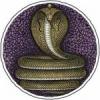
Seeing, Recognising & Maintaining One's Enlightening Potential
blue eyed snake replied to C T's topic in Buddhist Textual Studies
well, me thinks, most people never even dream of doing what you're doing and being were you are. Yes, but the being holy thing is pretty obvious. it sits much deeper, for instance, I feel that i'm doing a good job by tackling my fears and anger. It is a good job, but the thinking about it in this terms, thats is the little Bes, seeking confirmation from the outside, from my mom. Or,( i'm picking up my meditating again. ) " i'm a bad girl because i didn't meditate today" or a good girl because I did. It's all rubbish really. remember a time in the dojo when teacher asked us what gave us the most stress, answers came like, whether I'll keep my job, or illness etc. But when I let the question sink in I answered, the most stress i get from my own thoughts, theyr'e like a horde of hungry flies. and it's only now, some years later, that I 'get' what i told him then yes, even though I read little, when you've grown a bit, you get the message a little better me too -
Where is your ego? What is it made of? What is your experience of the "ego"? Buddhism, Hinduism, Taoism are not philosophies, they are practices. Do you remove darkness, or does the light simply spark a new being? These sound like mere textbook ideologies. Have you experienced these things? Where does your sickness in a dream go when you've woken up? Do you now cure it when you are awake? Written in stone? Then my body must be a stone? What? Remove the self? How do you remove a dream when you have once awakened??? I love your ideas, but it's just another form of mind play and logical speculation. Simply see reality as is right at this moment. No need for grand designs of the universe or grandiose interpretations of the self. Simplify it to this moment, like sway your hand in the air.
-
This: all in this fleeting world: A star at dawn, a bubble in a stream; A flash of lightning in a summer cloud, A flickering lamp, a phantom, and a dream. Is Buddha's Dharma, maybe you are like the Enkyoji Nichiren Buddhist Temple, that say you can " slander " Buddha's Dharma.
-
Hi all, I am looking to get a bit of advice on a topic that has had my head spinning in circles for some time now! - What would the Taoist approach to overcoming bad habits? I have a number of habits that I consider to be 'bad', in the respect that they cause me some degree of internal conflict whenever I indulge in them. I have come to the conclusion that the main problem underlying all of these habits is my lack of willpower. I always find myself falling back into old routines. Here's an example- From the age of roughly 17 (I'm 28 now), I have smoked cannabis. When I was younger I used it heavily pretty much every day with friends. As I've grown older the usage has declined massively. I now only smoke at the weekends and don't generally touch it during the week. But recently I have started to feel as if I am just smoking for the sake of it, and that it sabotages my ability to get things done and just generally makes me lazy and eat too much etc.. I was discussing the issue with my partner to get her thoughts on it, and she feels the same way- that the enjoyment factor has started dropping away and we are just doing it because it's what we have done for so long in the past. So I came up with the idea of just smoking occasionally only when friends come and visit, say every 2-3 weeks, and that we wouldn't do it when we are alone. We have recently returned from a holiday in India, so haven't touched anything in 2 and a half weeks, but now that I'm home I can feel the pull of the bad habit creeping back in. I always seem to crumble and then just end up mad at myself for giving in. Another example is meditation practice- something which I do thoroughly enjoy, but never manage to stick to for more than 3-4 weeks. These habits just go around in continuous cycles. Is self improvement just some kind of mental trap? I'm not sure if I should just allow things to run their course and stop trying to improve/strive for these ideals that I dream up for myself. I look forward to hearing from you guys and getting your insight on this situation Kind regards.
-
Part 5 idealism and materialism as a rejection of basic axioms ( especially for Nikolai and Ralis :-)) As the previous part might have enlightened readers to why I believe there is some connection between the over arching aims of Daoism, then this part hopes to finally lay to rest the accusation that Objectivism is either dressed up Idealism, or extremist materialism. The idealists-Plato,Plotinus,Augustine, Hegel-regard reality as a spiritual dimension transcending and controlling the world of nature, which they regard as deficient, ephemeral, imperfect or as partly real. Since spiritual has no meaning other than pertaining to consciousness, the content of true reality in this view is some function or form of consciousness. This amounts to nothing more than the primacy of consciousness-to the advocacy of consciousness without existence. Ayn Rand describes this epistemology as mystic "Mystics of spirit". Mystics because they hold that knowledge (true reality) is not derived from sense perception, or reason based on it, but from an otherworldly source such as revelation or its equivalent. A typical example is religion and the belief in the supernatural that is common to all idealist creeds. Supernatural means 'beyond nature'. It would have to be a form of existence beyond existence; a thing beyond entities; a something beyond identity. It is an assault on everything man knows about reality. It is a contradiction of rational metaphysics and a rejection of the basic axioms of philosophy. It simply brushes aside everything perceived or known and replaces it with unproven myth. The popular version of idealism is the belief in a super natural God: Is God the creator of the universe ? Not if existence has primacy over consciousness. Is God the designer of the universe ? Not if A is A. The alternative to design is not chance (as Einstein said God doesn't play dice). It is causality. Is God omnipotent? Nothing and no one can alter the metaphysically given. Is God infinite? Infinite is larger than any specific quantity-it is no specific quantity. It would be a quantity without identity. As A is A every entity is finite; it is limited in the number of its qualities and extent;this applies to the universe also. One can suggest a number sequence, or the division of a line is infinite, but the reality is that wherever one stops counting or dividing, there one is at the finite. Can God perform miracles ? A miracle is not merely the unusual. A woman giving birth to full size elephants would be a miracle. Is God purely spiritual ? Spiritual means pertaining to consciousness and consciousness is a faculty of certain living organisms. Such a thing would require to be non-conscious. If one is to postulate a supernatural realm, one must give up reason, proof and definitions, instead relying on faith. Objrctivism advocates reasons mans only means of knowledge therefore it does not accept God or the supernatural. We reject every spiritual dimension, force, form, identity, power that is alleged to transcend existence. We reject idealism and only accept reality. This does not mean Objectivists are materialists. Materialists-Hobbes, Democritus, Marx, Skinner champion nature but deny the reality or efficacy of consciousness. Consciousness, in this view, is either myth or useless by product of the brain. In objectivist terms this amounts to the advocacy of existence without consciousness. It is the denial of mans faculty of cognition and therefore all knowledge. Rand describes materialists as "Mystics of muscle". "Mystics", because, like idealists, they reject the faculty of reason. Man, they hold, is essentially a body without a mind. His conclusions, accordingly, reflect not the objective methodology of reason and logic, but the blind operation of physical factors, such as atomic dances in the cerebrum, glandular squirtings, S-R conditioning, or the tools of production moving in the contortion known as the dialectic process. Despite their implicit mysticism, materialist typically declare that their view point constitutes the only scientific, or naturalist approach to philosophy. The belief in consciousness, they claim, implies super naturalism. This claim represents a capitulation to idealism. Consciousness is an attribute of perceived entities here on earth. It is a faculty possessed under definite conditions by certain groups of living organisms. It is directly observable by introspection. It has a specific nature, including specific physical organs and acts accordingly. Lawfully. It has a life sustaining function: to perceive the facts of nature and to enable the organism to act succesfully. It is neither unnatural or supernatural. There is no basis for the suggestion that consciousness is separable from matter, let alone opposed to it. No hint of immortality and no kinship to a transcendent realm. Like the faculty of vision (one of conscious aspect) and the body, the faculty of awareness is wholly, this worldly. The soul is not mans ticket to another realm; it is a development of and within nature. It is biological datum open to observation, conceptualisation and scientific study. Materialists argue that consciousness is unnatural on the grounds that it cannot be perceived by extrospection, has no shape, colour or smell-all of ehich applies equally to the faculty of vision. One may just as well argue that the eyeball is unreal because it cannot be perceived by introspection, does not have the qualities of a process of awareness, cannot theorise itself, suffer neurosis, or fall in love. These two arguments are interchangeable. It makes no more sense arbitrarily to legislate features of matter as the standard of existence and deny consciousness, than to do the reverse. The facts are that matter exists and so does consciousness. Materialists sometimes dismiss consciousness because it cannot be defined. This overlooks the fact that there cannot be infinite regressions of definitions. All definitions reduce to primary axioms. The concept of matter, by contrast does require a definition as it is not axiomatic, it does not as yet have one. To provide one is not the task of philosophy, but of physics. As far as philosophers are concerned, matter denotes merely the objects of extrospection-that which all such objects are made. In this usage, the concept of matter, like the concept of consciousness can be specified ostensively. There is no valid reason to reject consciousness or to struggle to reduce it to matter; not if such a reduction means to define it out of existence. Even if consciousness was one day explained scientifically as a product of the physical, this would not alter the observed fact. The monist insistence that, despite the observed facts, reality (or man) can have only one constituent, is groundless. It is an example of re-writing reality. The materialist equation of physics with science is equally groundless. Science is systematic knowledge gained by the use of reason based on observation. In using reason, however, one must study each subject matter by methods and techniques suited to its nature. One cannot study history by the methods of chemistry, biology by economics, or psychology by physics. Pythagoras attempted to equate mathematics with cognition and construe the universe as numbers. The modern behaviourist with far less excuse, commits the same error in regard to physics. I behaviourist wants to deal with entities he can weigh and measure just as the physicist does. For him, consciousness represents a stumbling block that denies his dream of turning men into predictable robots. Instead of dealing with consciousness he decides that it must therefore unreal and sweeps it beneath the rug in an effort to stamp it out. He is attempting to rewrite reality by deliberate ignorance. The primacy of consciousness use to deny consciousness ! A philosophy that rejects the monism of idealism or materialism does not become dualist. That term is associated with platonic or Cartesian metaphysics; it suggests a belief in two realities, in the mind body opposition, and the souls independence of the body. All of which are denied by objectivism. None of the standard terms applies to objectivist metaphysics. All the conventional positions are fundamentally flawed, and the ideal term-existentialism has been pre empted (by a school of advocates for non existence). A new term is required and that term is Objectivism. As yet it does not dredge up old and irrelevant associations
-
Part 4 the metaphysically given as an absolute. The objectivist view of existence culminates in the principle that no alternative to a fact of reality is possible or imaginable. All such facts are necessary. The metaphysically given are facts inherent in existence apart from human action-man made facts. Man made facts are objects, institutions, practices or rules of conduct that are man made. For instance Death is a metaphysical given, but murder is man made. The solar system is a metaphysically given and communication satellites are man made. Absolute in this context means necessitated by the nature of existence and therefore impossible to change by human, or other agencies. A fact is necessary if it's non existence would involve a contradiction. A fact that obtains by necessity, is a fact that obtains by identity. Necessity in the present sense is not a datum above and over existents; it is the identification of existents from a special perspective. To be, is to be necessary. In holding the metaphysically given as an absolute, Rand is not denying the power of creativity. The power to adapt the materials of nature to ones own requirement-such as the irrigation of a barren desert to make is bloom. A barren desert is a metaphysically given, but man has the power to change the circumstances responsible for its barrenness. The desert necessarily remains barren. Creativity is not the power to create something out of nothing,more to make an entity act contrary to its nature. It is, instead a re-arrangement of natural elements that had not existed previously. Francis Bacon: 'nature to be commanded must be obeyed'. The difference between the metaphysically given and the man- made is crucial to every branch of philosophy and human life. They must be treated differently according to their nature. Metaphysically given facts are reality. They must be accepted without evaluation. Man made facts, being products of choice, must be evaluated. The man made cannot be aquiesced to merely because it exists. The man made must be judged then accepted, rejected or changed when necessary. The attempts to alter the metaphysically given is to attempt to re-write reality. A common example is those who condemn life because man is capable of failure, frustration and pain. They yearn for a world in which man knows only happiness. Yet if the possibility of failure exists, then it necessarily exists (it is inherent in the fact that achieving a value requires a specific course of action and man is neither omnipotent, nor omniscient in regard of that action). A variant on this is that death makes life meaningless, but if living organisms are mortal, then they are necessarily so by the nature of the life process. To rebel against death is to rebel against life and reality. It is to ignore the fact that indestructible objects have no need of value or meaning. Respect for reality does not guarantee success in every endeavour; the refusal to evade or re-write facts does not make one infallible or omnipotent . However, such respect is a necessary condition of succesful action and it does guarantee that, if one fails in an undertaking, he will not harbour a metaphysical grudge as a result. He will not blame existence. The thinker who accepts the absolutism of the metaphysically given recognises that it is his responsibility to conform to the universe and not the inverse. Plato concluded that matter is a principle of imperfection in conflict with the highest ideals of spirit. In a perfect universe, he thought, matter should obey consciousness. Since it does not, Plato believed the universe flawed. A perpetual battleground between the noble and the actual. When men expect reality to conform to their wish, simply because it is their wish, they are doomed to metaphysical disappointment. This leads to the dichotomy: my dream vs the actual which thwarts it, or the inner vs the outer; value vs fact; moral vs practical ; the spiritual vs the material realm. Here lies the mind/body dichotomy which has corrupted every branch of philosophy. It does not have its root in a real conflict, but a breach between some men's consciousness and existence. The basis of the theory is not reality, but human error; the error of turning away from reality, of refusing to accept the absolutism of the metaphysically given. The man whom follows the opposite policy comes to the opposite conclusion. He dismisses the metaphysical dichotomy. A faculty of perception is not an adversary of the world, or the body. It has no weapons with which to wage any such war; it has no function except to percieve. ( we might see the same kind of wars played out by current political policy. The war on poverty, drugs, terrorism etc. It is a clear falsity, no such war can ever be fought. What is being foolishly attempted is the war between men's spirit and reality). Ayn Rand holds that the conventional viewpoint is wrong.; man does not have to make impossible choices between the spiritual and material sides of life. It is not a clash, or warfare, but integration, unity and harmony. The theory of mind body harmony, like its platonic antithesis, has its roots in a real correlate. Its root is the fundamental harmony and serenity that flows from accepting as an absolute, the axiom that existence exists- and there we might glimpse the correlation with the Dao as it might be understood .
-
Oh contrare, I certainly do know that you think and would never-and have never asserted that. Certainly I would say that you don't do so adequately, that your reasoning is in error and so are your conclusions. I certainly know what's going on in your mind because you write it down. Unless you are in the habit of posting complete rubbish, then I must assume that this is what you believe to be true. I don't, however know if you like a certain food, or dream of being a ballerina, but then you don't post those specifics.
-
I agree with you roger. The "Universal" as you call it (as good a label as any) occasionally wakens within us. It becomes self-aware in us, like we wake up and open our eyes and see our Self in everything "out there" - yes? It can be a big and obvious event or it can be a subtle hint, a whisper, almost like you're in a dream and you thought you heard someone call your name and you're not sure so you start looking to see if someone is there, hiding. Or it can simply be a feeling of dissatisfaction with the way things are, like something is missing. I think this is the most subtle. I think this latter form can be highly motivating (the Buddhists make very good use of it in the ngondro practices) but can also be destructive, like when people are wealthy and fortunate enough to be able to acquire everything and anything they could possible want, but even all of that doesn't make them happy. Then they get depressed and frustrated and turn to addictions (sex, drugs, food, alcohol) to numb the empty feeling. I went through all of that to simply say that, yes, the spiritual exercises give the Universal a focused activity to try and break through into our lives. I think they are particularly useful because they have a few things in common - 1. quieting of the inner narrator and thought train that we ride around on most of our lives 2. connection between mind and body - this has a powerful ground and stabilizing effect and also brings us into this very moment 3. taking the focus off of the "me" that has problems, preferences, the one that judges everything - some traditions do this through focusing on others, some focus primarily on mind-body connection, some get us into nature, some by dismantling or trying to locate that "me", but I think this dis-identification is basically important. - this isn't meant to be an exhaustive or authoritative list, just a few casual observences Once we open enough to feel that in a bit more tangible and stable way, it is something that can and should take root in every aspect of our waking, sleeping, and dreaming lives - total integration. That's a lot more challenging but ultimately very fulfilling and somewhat self-sustaining. I say somewhat because, at least in my experience, this connection and motivation waxes and wanes considerably over time, especially as we try to continue to live in the "real world."
-

The Diary of a novice Taoist (Open for everybody)
ChiForce replied to Veezel's topic in General Discussion
You can't be this serious??? Right?? Son, you are talking to someone who has received the Chan mind transmission from a dream and have been on the Dharma path for the past 20 years. You are telling me you are with the Tao because your heart tells you to buy a PS3? Son, you don't have a heart. Your energetic energy has not reached to a point that your heart channel is open and being filled with Chi. Your heart does not talk to you. You are just a kid being attached to toys, fun and games. I am a gamer too and in fact worked in the gaming industry in the past. I have seen little kids losing their minds over games and to the point that making the parents upset. Hehehehe.... They go crazy with games like Pokemon or Yogiho. The older generation kids go crazy with Japanese animes and RPGs. The big kids go crazy with shoot em up stuff and playing soldiers. Oh, I recently built a mid to high end PC to play games like Fallout 4 and Dragon Age Inquisition and some racing sims. Of course, I don't just play games with this PC. I used it to do photography editing work. You have a long ass way to go if you think you know the Tao...... -
I remember one dream. In it I was talking to my college room mate who had recently died. I remembered he was dead and it came to that this must be a lucid dream and the conversation went on. Often in lucid dream even with accomplished people, only one side remembers the conversation. I don't know if that proof it didn't really happen, or if you're contacting a person beyond there normal remembering consciouness. Michael
-
I can pretty much lucid dream at will but there is one method which almost guarantees me lucid dream time. I set my alarm for a time when I know I am going to be in a very deep sleep. The alarm goes off and I stay awake for about 10 - 15 minutes, then I go back to sleep and POW, lucid dream. I also read of a vitamin combination which can induce lucid dreaming. If I find it i'll post it up.
-
Try looking on any Out Of Body Experince forums. They have many techniques for this kind work as they use it for their OOB experiences. Keep us posted on your experiences. I find that its when I wake up I have lucid dreams. If I set an alarm and wake up to the alarm, I am often dragged out of the dream state. I experience the last few minutes of the dream as a reality I can't tell the difference between these last few minutes and my wakings days. They are so real I remember having conversations where I have no idea what the other person will say, been places and done things. Just as real as what I experience when I'm awake. It makes me wonder what is going on because it all seems that it has come from outside my mind. There is a clear difference between hazy thoughts and day dreaming to the lucid dreams I experience. I think that if you wanted to experience more lucid dreams it might be worth instead of trying to remain conscious as you drift off to interrupt the dreams. Set your alarm clock for several points during the night. This would bring you out of the dream state, so you would remember much more. The problem with this is that it interrupts your sleeping patterns which will affect your physical and mental health. Perhaps its best practiced one a week. I think you could end up feeling that you live in both worlds so it could have a bad effect on your daily life. Anyway, keep us posted on your progress.
-
Well said! Karl's neoliberal objectivist ideology is based on me first selfishness and absolute property rights. He fails to understand the dynamics of society and how all can have their needs met. Laissez Faire capitalism has never worked nor is a viable solution to dynamic social constructs. Even with the pipe dream of unfettered capitalism, all the wealth will eventually rise to the top 1%.
-
This is an interesting topic and I think there is often a lot of confusion about picking one over the other, but I believe that this difficulty of choice results from a fundamental misunderstanding of the root differences inherent in both ways of life; because once you comprehend it, you will see how clearly contrary both are to one another - and the choice would always be simple to make, but this is how it is; when we are unclear about something; it is difficult to make a choice. Is it no so? The simple answer in my opinion is this: Buddhism is founded on the belief that life is suffering and altogether an experience which should be escaped in order to achieve liberation. - This concept nurtures and supports the development of an attitude in practitioners which, while not entirely nihilistic, doesn't create any architecture to encourage one to live life to its fullest. Rather, one becomes perpetually impregnated by the idea of being born into a world which can never offer anything more than sickness, pain, old age, death and good old suffering #funtimes #whybother #whereistheexit Why is this such a problem? - Because it programs practitioners into becoming passive contributors to society. After all, why would you bother with developing society when by definition the universal law of samsara is the suffering of impermanence. Better to dedicate as much time as I can to getting the hell out of here, right? With the exception of Zen Buddhism in countries like Japan, which is very strongly influenced by Taoism, almost every major country of early adopters of Buddhism, which have it as it's primary religion, suffers from some form of poverty, underdeveloped civilisation, sub-standard social infrastructure and unacceptable forms of inequality. To really understand and experience Buddhism, you have to become a monk or a nun - and that demands that you abandon society and minimize your contribution to the human race. As far as I am concerned, that is existential suicide and a disservice to your higher self. Here we are these amazing beings, eternal souls manifest by will into this finite body of flesh and blood to transform the very fabric of existence, just waiting to explode source from our very core and shake and vibrate every being in our proximity like a blast wave of cosmic godhood, changing minds, influencing lives and impacting humanity through the power of our imagination and multidimensional consciousness - but, hey... lets avoid this, it's just full of suffering. Instead, lets symbolically shave our heads in discard of the very thing we came here to experience, put some robes on, and live the rest of our lives in a small barren room, reciting texts, chanting and taking care of our own preconceived ideas of life. Right speech, right view, right intention, right action, right this right that... Very many rules... the more rules you have, the more ritualised a discipline becomes. The more ritualised it becomes, the easier it is to miss the mark and deviate entirely into religious territories and there is a HUGE difference between Spiritualists, Philosophers and Religionists within the major traditions. If there is so much right... then whatever else must be wrong... Taoism, does not see things this way. Right and Wrong, are Yin and Yang, and part of nature. Every situation is relative. Here's what's unpalatable to me about the foundation of Buddhism.... Shakyamuni, was a prince. He lived a lavish life and saw nothing but the best of what the world had to offer. He had the nicest house, the nicest food, the nicest drinks, the nicest girls and the nicest most pimped out elephants you can think of in leu of cars. We can thank his over protective dad for all that. By all standards, this man was biased as they come. He was more biased than Donald Trumps toupe. Anyone who only sees one side of the coin in a realm of duality, and does so for 29 solid years before he begins to perceive nature as it is, is indisputably BIASED to the ways of the world. He was nearly 30 when he left the palace for the first time. In other words, he was a grown ass man with some pretty solid ideas already formed about his subjective understanding of reality, and that sort of idiosyncratic psycho-emotional complex is not really the sort of slate you can just wipe clean with some cheap windex. As I'm sure you all know by now, it can take hard work and a long time to polish that stone clean again. OF COURSE, when he leaves the palace on his chariot and is faced with the reality of sickness, aging and death, the rosy pink glasses are blown right off his face and he concludes that all life has to offer is suffering. Nothing surprising here... But I ask you the members, who of us here who has lived every year of their life in the midst of society and experienced life unabridged, lived every pain, every loss, every fight for survival, overcome every triumph, suffered every humiliation and stood up to face your fears, can tell me that life is not also full of love, of compassion, of wisdom, of understanding, of joy, of laughter, of boundless curiosity and unmeasurable creativity, of music, of dance, of ecstasy and orgasmic pleasure. Who here who was not deprived of his right to live freely, can concur with Buddha and affirm that life is but a suffering so torturous that even within its pain there can be found no constant to lighten it's burden, and that our greatest aid in this mechanism of experience to lessen our karmic ache is the microscopic glimmer of relief presented in the pause between our constant migration from the foul end of one misery to the better end of another - granted to us as a reward for our resilience and our choice to be here. So detestable, repulsive and frightening is it, that from the heights of the suffering it induces and our comprehension of it, we can actually give birth to compassion towards others, so that we can climax in the joining and recognition of their own suffering in a petulant concert of universally orchestrated mutual existential self pity. Have you ever contemplated the psychological repercussions of clay moulding your view of life around the ideology that for the duration of our natural physical lives we are inescapably subjected, even imprisoned by and immersed into this three dimensional world whose entire volume resembles a thick ectoplasmic goo of inescapable suffering? What sort of mindset does that create? Is it a positive view? Is it a negative view? Is it a neutral view? I will let you contemplate it. I myself would argue that it is most certainly a negative one. Alright.. now why does all this REALLY matter when it comes to energetic and spiritual cultivation? In my experience, EVERY, SINGLE belief formed and held and fed through ritual and habit WITHIN the acquired consciousness (mind) of the individual, contributes to manifesting a collective consensus consciousness. Something that is the product of like minded ideas and emotions which cohese together to create a particular vibration of energetic potential. When enough of these self-created energetic potentials pool, they have the power to integrate themselves into union and actually manifest as an experienceable reality to which we can tune into like the frequency dial on a radio. These dimensions can turn into, for the lack of better phraseology, an energetic abode or landing zone for those minds whom subscribe to the respective thought pattern. Depending on the quality and purity of the ideas, these can leapfrog and propel certain aspects of our consciousness into the non-energetic dimension after and even before the death of the physical body. How pure and clear these ideas are will determine how deep they can penetrate into the depth of the Tao to establish a locale for the foundation and preservation of the collective belief. That is why, the MIND is the limit, but it is also our primary tool. It is like a tuning fork. Put two together and strike only one and they will both begin to resonate at the same frequency. Be careful, what sound is being sung around you, does it open your mind, does it close it, or does it form it into a specific shape? - And most importantly how far can we take form into the formless realm? Can it enter at all? Think about it. You mind must be formless. It is like a formless key that enters a formless gate, nothing else shall pass. This is very important, because it means that the NATURE of thought and the NATURE of the founding views of any religion directly correlate with the frequency to which the mind of the practitioner is attuned and then fixed; and the respective vibration will directly channel them into the non-physical reality to which they have affiliated and bound their consciousness to; and we will ultimately become that reality. So my question is this, based on Buddhas biased view of life, through which he derived the theory of suffering and which he used as the foundational basis for the construction of what later became Buddhism - HOW deep, or if you prefer, how HIGH will locking your mind to that frequency and vibration of thought help you penetrate into the ultimate nature of reality, which is, well.. unbiased, non dual and non polar? Do you think it can take you all the way? It is an important question to consider and perhaps one of the reasons for which there have been long discussions about the merits of Buddhism as a complete practice as opposed to a spring board into higher practice. Earlier I spoke about civilisation and I want to touch on it again, because as a Spiritual Taoist, I believe very strongly in our value as human beings and our ability to contribute to developing civilisation, improving living conditions and helping humanity evolve spiritually, but also socially, ethically, technologically, as humanitarians and as philanthropists. Because of the remarkable influence religion has on the people of the world, it AUTOMATICALLY, becomes responsible for the effect it has on humanity. It's just like having a twitter account. If you have 5 followers, it's not a big deal, you can fart around and not care much about what you say, but if you have 5 million followers, you're painting with a much broader and heavier brush, and the strokes you make, whether you post pictures, videos, or textual tweets, will impact and influence all those individuals on a personal level - and you now become something much more; a powerful idea, a dream, an aspiration; and when you have such power, you must recognize that and decide on how you will change the world. Will it be for the better or for the worse? I measure and valuate anything by what it does to help people and advance humanity - and religion does not fall short of this judgement. So, when I look at Buddhism, I ask myself - how did the Buddha help civilisation develop as a direct result of his ideas? How did he balance worldly life with spiritual life? Maybe I am uninformed, but I cannot find many ways in which he contributed to that. I once asked a zealous Buddhist practitioner the very same question, and he said Buddha taught his disciples how to wipe after doing a number 2 and brush their teeth. Till this day I don't know if he was being sarcastic or he actually meant it, perhaps someone can clarify this. The attitude which these teachers instil in their students directly influenced their perception of life and directly changed the way in which they behaved, because of this I think Jesus did a FAR better job as a spiritual leader compared to Buddha, because despite both having talked about compassion, Jesus's ideology was founded on love. It was a positive message, which encouraged a positive view of life and not a negative one - and maybe it's just coincidence, who knows, but the majority of countries who adopted Christianity as a primary religion, have been very active in social reform, political growth, technological innovation, most of their countries have solid infrastructure and Christians are generally very pro-active get it done sort of people. The attitude towards life is a positive one, not a negative one. Maybe I'm just talking out of my ass, you tell me? If we try to interpret all this from a Taiji perspective, I would say that Buddhas way is very Yin and leads to a passive and negative attitude towards physical life. There is no embracing of worldly life, no Yang. It is only when the two merge together in harmony that can we pierce into truth. Taoism on the other hand, in particular the Spiritual Taoists who were just sages and hermits and existed way before the formation of Religious Taoism have a very different view of life. Physical existence to a Taoist, well... it just is. There is no prejudice or bias. We don't think it's negative or positive. It is what you make it. Buddha decided to make it a negative thing and because of this in my opinion transformed his teaching into a mild form of spiritual extremism. Taoists on the other hand have always sought harmony. The physical experience was to be merged with the spiritual to bring about complete unification of Yin and Yang and reveal the fundamental non-polar nature of Wuji. Ancient Taoists hermits didn't start in the royal palace, although some of them climbed quite high on the social ladder. They were in nature and in life from the get go. They observed it in all its true colours, the good with the bad. Health and Sickness, Youth and Old Age, Birth and Death. To them this was the natural cycle of nature. They understood that all things were this way and they adopted the fundamental concept of Yin and Yang that govern the waxing and wanning of all happenings in the Tao. They recognized duality and pierced into Wuji to unravel the ultimate truth. They did this not by going to spiritual extremes, out of shock or fear of some sudden realisation, but by becoming one with the nature that was all around them since birth, and by following the balance of nature, they learned to attain levels of supernatural vigour, perception and wisdom. So the fundamental difference here between the two is that while Taoism begins from a neutral point and directly focuses on harmonizing Yin and Yang (Taiji) to revert to Wuji, Buddhism is biased through a negative mind construct from the start, which directly impacts the level of possible realisation, because Sakyamunis mind was already formed in one direction, while the mind of the Taoist sage was in the centre. It might sound like a insignificant difference, but when you appreciate the importance and influence of mind in spiritual work, you will understand how big a contribution in makes to what is attainable. When we look at Taoism and civilisation... well... I don't even know where to begin. Because Taoism encouraged living life, experiencing life, understanding, investigating nature and investigating ones self; this attitude lead to a plethora of technological innovations which revolutionised Chinese civilisation, things such as herbology, accupuncture, herding, massage, qigong, taiji and countless others. All these were invented in an effort to make life easier and more enjoyable. They were methods to prolong life not to escape it and they helped to increase the positive experience of life and advance humanity and civilisation. Furthermore, Spiritual Taoism has no dogmas. There are no rules to follow, no books to read, no right way or wrong way. No paths. Taoism is the way of no way. The path of no path. Even Laozi said Tao Ke Tao Feichang Tao (The Tao That Can Be Explained Is Not The True Tao). Even so, millions have flocked to do just the opposite of that, and take his writings to be the be it all of Taoism. Please don't forget that, many of the teachings we follow today were authored thousands of years ago to cater to the people of the time, their minds, their wisdom, their culture and their level of civilisation. Do not look to the old books blindly. Those guys are long dead. Take what is useful, discard what is useless, add what is specifically your own. Bruce Lee said something like that. THAT, is the only way to advance civilisation, and not by becoming clones of a wisdom designed to open the minds of humans several thousand years ago. Although many of these wisdoms are valid today. I urge you to open your mind and develop your own wisdom through the exploration of life, just like the masters of yore. Do not lock yourself within the diapazon of their own wisdom such as they shared it with us through writing. Take it and go beyond even! There is no limit. This is the difference between being a follower and being a Spiritual Taoist. Always remember that every moment of our existence every breath we breathe, every action we take whether good or bad are all part of the Tao and contribute to our inevitable evolution. We bare the consequences of all our actions and when it comes to life we grab the bull by the horns. As Taoists, we can eat what we like and have sex, start a family and contribute fully to society with our skills. We can run a successful business, deal with money, build corporations and help advance civilisation. There are no rules, only actions and consequences. The world is our oyster. MOST importantly, we do not encourage anyone to run from or escape worldly life and society. Instead we combine and merge the physical with the spiritual. Harmony is the most direct path to non-duality. If you lean too far to one side or the other.. the momentum will keep the wheel of Samsara spinning. The key is what vibration you tune your mind to. There is no escape from existence, this is part of it. Believe me, you chose to be here. You WANT to be here. Find out why! Do you think that after you attain immortality you can come down to earth and save everyone on the planet with your godly powers? haha. That's not how it works. Taiji has laws and rules, Wuji also has laws and rules. The Taiji dimension is the playground of souls. The university of life. This is training day. Let me tell you what you'll do when that day comes for you. You'll choose to do the one thing you won't believe, and that is reincarnate again by entering Taiji through a natural birth so you can help other people awaken to their original nature. Not as a god, not as spirit, but again as this body of flesh. Don't underestimate your value. We all have worth. Some of you are already realised immortals and the soul in your current body is simply a projection of your non-physical self which is already dwelling in the emptiness of the Tao, and you are guiding countless beings through your wisdom in different galaxies in different bodies all simultaneously. What, you never thought you might already be an immortal and the soul in this body is just an extension from your realised body residing in emptiness? Well.. mind blown. Trust me when I said this. There is no limit to your wonder. If people like Buddha and Jesus Christ who gave and dedicated their lives to saving and liberating mankind then ascended and became gods and immortals. Then why didn't they just come back in an instant and awaken everyone with their powers in one go? Because there are laws... and some laws, even immortals can't break lest they be punished. So do not think lightly of yourself. You are a miracle of divine power here to manifest the truth of the ultimate reality in the hearts of others. Start with a spark and turn it into the fire of spiritual transformation : )
-
My, such an obvious conclusion. Plants are sentient beings too. LOL LOL LOL.............. Is ok to eat them but not animals??? Is that a wrong view or what? That's karma right there. In another note, I once head a voice in my dream/vision about not eating pork. I have a close affinity to Judaism...I think. However, I am not Jewish. Can not explain why I heard a voice about not eating pork. I eat meat but I don't crave meat. Not a heavy meat eater.
-
While that ^ could be considered true, as I read more (and perhaps in a more structured form ) , something important seems to be amiss. ~ Aside from the issue of things like his totally irrational and unscientific (IMO) 'proof' of the Book of the Law by the swapping of Hebrew letter attributions to the Tarot trumps Consider this 'course of background study ; http://hermetic.com/crowley/book-4/app1.html - Course 1 . General Reading Includes things like : The Yi King. (S.B.E. Series, Oxford University Press.) The "Classic of Changes"; gives the initiated Chinese system of Magick. The Tao Teh King. (S.B.E. Series.) gives the initiated Chinese system of Mysticism. Tannhauser, by A. Crowley. An allegorical drama concerning the Progress of the soul; the Tannhauser story slightly remodelled. The Upanishads. (S.B.E. Series.) The Classical Basis of Vedantism, the best-known form of Hindu Mysticism. The Bhagavad-Gita. A dialogue in which Krishna, the Hindu "Christ", expounds a system of Attainment. The Voice of the Silence, by H. P. Blavatsky, with an elaborate commentary by Frater O. M. The Goetia. The most intelligible of the mediaeval rituals of Evocation. Contains also the favorite Invocation of the Master Therion. The Shiva Sanhita. A famous Hindu treatise on certain physical practices. The Hathayoga Pradipika. Similar to The Shiva Sanhita. * Erdmann's "History of Philosophy". A compendious account of philosophy from the earliest times. Most valuable as a general education of the mind. ... The Oracles of Zoroaster. An invaluable collection of precepts mystical and magical. The Dream of Scipio, by Cicero. Excellent for its Vision and its Philosophy. The Golden Verses of Pythagoras, by Fabre d'Olivet. An interesting study of the exoteric doctrines of this Master. The Divine Pymander, by Hermes Trismegistus. Invaluable as bearing on the Gnostic Philosophy. ... The Age of Reason, by Thomas Paine. Excellent, though elementary, as a corrective to superstition. Rivers of Life, by General Forlong. An invaluable text-book of old systems of initiation. Three Dialogues, by Bishop Berkeley. The Classic of subjective idealism. Essays of David Hume. The Classic of Academic Scepticism. First Principles, by Herbert Spencer. The Classic of Agnosticism. Prolegomena, by Emanuel Kant. The best introduction to Metaphysics. The Canon. The best text-book of Applied Qabalah. The Fourth Dimension, by H. Hinton. The text-book on this subject. The Essays of Thomas Henry Huxley. Masterpieces of philosophy, as of prose. ( with the possible exception of * Erdman ) ..... notice a major aspect missing ? Throughout the whole curriculum it seems very light on obvious Platonic writings. Some of the issues related to that are in this text example https://books.google.com.au/books?id=zOJoAgAAQBAJ&pg=PA210&lpg=PA210&dq=Aleister+crowley+on+platonism&source=bl&ots=7GiStIaUZz&sig=hXUl1Z_OnYSthXZh65so9-dfZuM&hl=en&sa=X&ved=0ahUKEwjT47rQq63MAhVGHpQKHe-JDKAQ6AEIGzAA#v=onepage&q=Aleister crowley on platonism&f=false No doubt Donald will be forthcoming to detail the further 'damage' .
-
'Tongue in cheek' why Sir, you surely mistake me ;-) The whole Global warming scam was always a socialist pipe dream for smuggling communism in through the back door. Of course those that footed the bill to get it going have made a nice fat profit, and the research scientists get lots of tax payer grant funding. It's obvious to anyone with an ounce of intelligence, that the Eco warriors commonly conflate pollution with global warming and construct a story around 'destroying the planet' in order to destroy capitalism and reduce everyone to living it mud huts and aurtarky. They must view Maos agrarian China of total labour and starvation as a minor miracle.
-

Seeing, Recognising & Maintaining One's Enlightening Potential
manitou replied to C T's topic in Buddhist Textual Studies
Excellent, excellent, excellent! I am ordering that book today. (Open Heart, Open Mind) I am predominately metal - rigid - and because of the years of Prozac, unable to feel much at all. More understanding of this, exactly what you posted, is what I need right now. I happen to be at the point where I am focusing on tigles (assumedly the same as thigles?) before going to sleep at night. The dream yoga is working incredibly well for me so far - I have never been much of a dreamer, especially because of the chemical. The way Tsoknyi Rinpoche compares the pathways of the nervous system to the pathways of the subtle energy body, it reminds me of the difference between a flock of birds that all turn to fly in a different direction, although not necessarily synchronized - as opposed to a flock of birds that shares a spontaneous and mysterious communication wherein the synchronization is immediate and perfect. Can't remember which type of birds those are -





